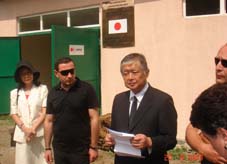Three new Japanese-funded projects are opened
By Messenger Staff
Tuesday, August 25

In the village of Urekhi a boarding school was opened. The Project for the Establishment of a Boarding School for Deaf-Mute Children in the Adjara Autonomous Republic formed part of the Grassroots and Human Security Grant Assistance Programme provided by the Government of Japan. The grant agreement for the above-mentioned project was concluded on 12 October 2005 between the Embassy of Japan and the Black Sea Eco-Academy. The opening ceremony of the new school, which will serve approximately 100 western Georgian children annually, was attended by H.E. Masayoshi Kamohara, Ambassador Extraordinary and Plenipotentiary of Japan to Georgia, and representatives of the local authority, as were the other two openings. The project cost 91,919 USD.
According to the Japanese ambassador since Georgia recovered its independence in 1991, Japan has continued to assist the state building of Georgia mainly by means of economic cooperation. “I believe it is necessary to keep a balance between assistance for the enhancement of economic growth and for improvement of the standard of daily life of socially vulnerable people,” Kamohara said at the opening ceremony adding that he is very delighted to know that this newly established boarding school will contribute to the development of a good educational environment for 120 children with hearing and speech impairment residing in the Adjara Autonomous Republic. As Kamohara said the funds for these projects are originated from Japanese taxpayers. “We would be grateful if you occasionally remember the goodwill of the ordinary people in Japan and try to make the best use of our projects,” he added.
Kindergarten No 1 in Poti, was reopened after being rehabilitated under a Grassroots and Human Security Grant Assistance Programme project. The grant agreement for this project was concluded on 19 November 2008 between the Embassy of Japan and the Self-Governed Poti Pre-School Educational Association. It aims to improve the learning conditions of children at the kindergarten and enable more children to gain preschool education through its rehabilitation. The number of children attending the kindergarten has increased from 100 to 150 thanks to the rehabilitation work, which cost 87,995 USD.
“Children are the future of the country. I hope that our project this time will encourage the children of Poti City to overcome the hardship they have confronted and to grow up to become bright adults in future. I believe that this generation will bring real prosperity to the country,” the Ambassador stated at the opening ceremony of the Rehabilitated Poti Kindergarten.
The third opening ceremony was held at the Farmers Cooperative in Japana village. The grant agreement for the Project for the Improvement of Farmers’ Cooperative in Japana Village in Lanchkhuti District, was concluded on 3 July 2008 between the Embassy of Japan and the Georgian Mountain Federation. The aim of the project is to improve the productivity of the Japana village Farmers Cooperative by providing agricultural machinery and constructing a park and an animal food production unit. Approximately 110 households in Japana village and 1,033 households in other villages will benefit from this project, which cost 84,926 USD.
As Ambassador Kamohara said this project will provide small-scale farmers of your cooperative with access to modern agricultural machinery. As a result of the collapse of the former Soviet Union, these farmers had to continue to use the old-fashioned machinery with low productivity.
The Ambassador also highlighted the attention on the village name “Japana”
“As all of you are aware, the name of the village “Japana” is very familiar to us. I have heard some history about this naming – for example, some people say that a long time ago Japanese merchants reached this village via the Silk Road and introduced to the villagers Japanese soybean, which later was named “Japana” by local habitants. Afterwards the village itself also has been named “Japana”, since cultivation of “Japana” soybean spread from this village,” he said.
Grassroots and Human Security Grant Assistance Programme grants are provided for relatively small-scale projects undertaken by municipalities, medical institutions, academic institutes and NGOs which aim to improve the living standards of Georgian people suffering from hardship. Such projects might be implemented in the field of public health, medicine, elementary and secondary education, social protection and environment, poverty reduction and increase of income. The Programme started in 1998 and so far 84 projects worth 5,641,072 USD have been implemented under it in Georgia. Japan’s total Official Development Assistance to Georgia amounts to 150.4 million USD and funds improvements in a wide range of areas such as economic infrastructure, the agricultural sector, the social sector, the cultural field and human resources development.
